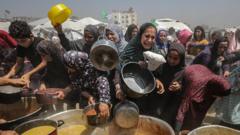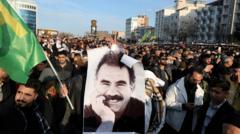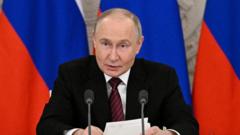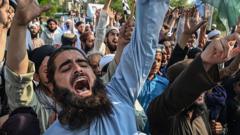The decision by the PKK to disarm could either mark the beginning of a peaceful resolution or highlight the reluctance of the Turkish government to offer meaningful concessions.
PKK's Disbandment: A Shift Towards Peace or Just More Illusions?
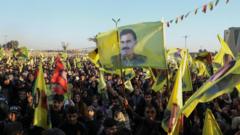
PKK's Disbandment: A Shift Towards Peace or Just More Illusions?
Kurdistan Workers Party ends its long-standing conflict with Turkey amidst mixed reactions from the Kurdish community.
The Kurdistan Workers Party, known as the PKK, has announced its decision to disband, ending a 40-year conflict that has claimed approximately 40,000 lives. This momentous event not only signifies the potential for a peaceful future for Turkey and its Kurdish minority, but also returns attention to the broader implications of the longstanding conflict between the PKK and the Turkish state.
Abdullah Ocalan, the PKK’s imprisoned leader, called for disarmament back in February, stating that there is "no alternative to democracy." However, uncertainty looms over whether the Turkish government will accompany this disbandment with promises of reforms or recognition for Kurdish rights. A ruling party spokesperson hailed the PKK's decision as a step toward a terror-free Turkey, yet skepticism prevails among many Kurds.
With the backdrop of a historic city like Diyarbakir, where the scars of conflict are evident, reactions are mixed. “They have tricked us for thousands of years,” lamented Necmettin Bilmez, a local driver, echoing a sentiment shared by many who feel betrayed by previous government assurances. On the contrary, 80-year-old Mehmet Ek expressed hope, wishing the resolution had come sooner, yet recognizing the tragedy of brother-on-brother violence. He advocates for amnesty for PKK fighters and the release of Kurdish politicians imprisoned for their activism.
The PKK’s decision comes after facing severe military pressure from Turkey, and its operatives have found their capabilities diminished due to the evolving regional landscape in Syria and Iran. Many Kurds now view Ocalan as a pivotal figure whose release might herald genuine progress. One woman, Menice, shared her heartbreak over losing family members to the conflict and emphasized that true peace is unattainable without Ocalan’s freedom. “If he is free, we will all be free,” she declared.
The sentiment across Diyarbakir is one of cautious optimism; although many yearn for the end of hostilities, the fear of unfulfilled promises casts a shadow on their hope. Ibrahim Nazlican reflected on the futility of the violence, stating, “There are no winners,” as he sipped tea under the ancient city walls, which have witnessed so much suffering.
As the PKK takes this historic step, the critical question remains: will this disbandment pave the way for a new chapter in Turkish-Kurdish relations, or will it merely serve as another episode in a protracted struggle for recognition and peace?
Abdullah Ocalan, the PKK’s imprisoned leader, called for disarmament back in February, stating that there is "no alternative to democracy." However, uncertainty looms over whether the Turkish government will accompany this disbandment with promises of reforms or recognition for Kurdish rights. A ruling party spokesperson hailed the PKK's decision as a step toward a terror-free Turkey, yet skepticism prevails among many Kurds.
With the backdrop of a historic city like Diyarbakir, where the scars of conflict are evident, reactions are mixed. “They have tricked us for thousands of years,” lamented Necmettin Bilmez, a local driver, echoing a sentiment shared by many who feel betrayed by previous government assurances. On the contrary, 80-year-old Mehmet Ek expressed hope, wishing the resolution had come sooner, yet recognizing the tragedy of brother-on-brother violence. He advocates for amnesty for PKK fighters and the release of Kurdish politicians imprisoned for their activism.
The PKK’s decision comes after facing severe military pressure from Turkey, and its operatives have found their capabilities diminished due to the evolving regional landscape in Syria and Iran. Many Kurds now view Ocalan as a pivotal figure whose release might herald genuine progress. One woman, Menice, shared her heartbreak over losing family members to the conflict and emphasized that true peace is unattainable without Ocalan’s freedom. “If he is free, we will all be free,” she declared.
The sentiment across Diyarbakir is one of cautious optimism; although many yearn for the end of hostilities, the fear of unfulfilled promises casts a shadow on their hope. Ibrahim Nazlican reflected on the futility of the violence, stating, “There are no winners,” as he sipped tea under the ancient city walls, which have witnessed so much suffering.
As the PKK takes this historic step, the critical question remains: will this disbandment pave the way for a new chapter in Turkish-Kurdish relations, or will it merely serve as another episode in a protracted struggle for recognition and peace?


